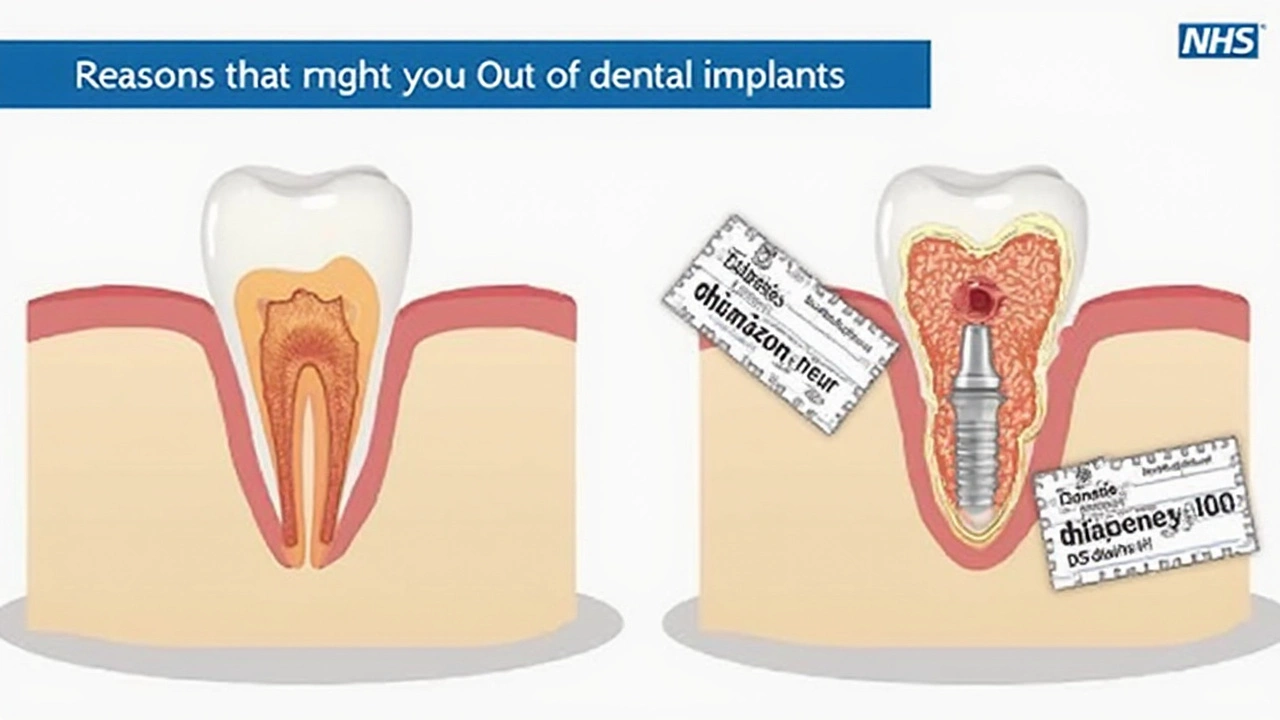 May, 1 2025
May, 1 2025
Ever been told dental implants would solve your missing tooth problem, only to find out you’re not a candidate? It’s frustrating. You hear about implants left and right, especially in the UK where they’re pushed as the gold standard for tooth replacement. But here’s the thing—not everyone is actually eligible, and no dentist can skip the rules.
It all comes down to your health, your bones, your habits, and sometimes, just bad luck. Certain medical conditions make surgery a huge risk. Weak or receding gums? Not a good sign. Smoking? Don’t even get me started. There’s even a minimum age—so if you’ve got a kid like my Jasper asking about implants, hold off. Dentists have to tick a bunch of boxes before they’ll even consider drilling.
If you’re wondering if you belong in the “no-go” camp, stick around. We’ll break down what really matters and give you some honest tips for what to do if implants aren’t on the cards for you right now.
- Why Dental Implants Aren’t for Everyone
- Health Problems That Block Implants
- Lifestyle Habits That Can Ruin Your Chances
- Bone and Gums: The Dealbreakers
- What to Do If You’re Not Eligible
Why Dental Implants Aren’t for Everyone
If dental implants seem like a one-size-fits-all fix, the truth is less exciting. Not everyone in the UK—or anywhere else—can just book in for dental implants and walk out with a new smile. There are real limits, and sometimes they’re outside your control.
First off, getting dental implants is surgery. We’re talking about placing a titanium post in your jawbone, which asks a lot from your body. If you’re not healthy enough for a small op, you’re likely not a candidate. Common dealbreakers include uncontrolled diabetes, bleeding disorders, or certain immune disorders.
Then there’s your mouth itself. Don’t have enough jawbone? Implants might not hold at all. If your gums are in bad shape or you suffer from chronic gum disease, any implant could fail pretty quickly. It’s a harsh reality: healthy bone and gums aren’t optional—they’re the foundation.
Kids and teenagers have to wait because their bones are still growing. Even if your child has lost a tooth, most dentists in the UK say no implant until the bone stops developing—usually around age 18 for boys and a bit earlier for girls. That’s why my son Jasper’s got to stick with his braces and removable fixes for now.
Life choices also matter. Smoking is a big red flag. Research from UK dental groups shows smokers are up to three times more likely to see their implants fail. Drinking heavily doesn’t help your odds either. It’s not judgment—it’s just how the body reacts after surgery.
Money sometimes blocks your way, too. The NHS won’t fund dental implants except for very specific cases, so people need to go private, which isn’t cheap. Check this summary to see who often runs into trouble:
| Reason | Impact on Implant Candidacy |
|---|---|
| Uncontrolled Diabetes | Higher risk of complications, usually not recommended |
| Heavy Smoking | 3x higher risk of implant failure |
| Under 18 | Still growing, so usually not allowed |
| Severe Gum Disease | Poor healing, higher chance of failure |
So, no—dental implants aren’t an option for everyone. Doctors have good reasons not to rush it. But don’t lose hope; sometimes there are ways around the issues, and we’ll cover those later.
Health Problems That Block Implants
You might be surprised by how many health issues can stop you from getting dental implants in the UK. If your body can’t heal well or fight infection, a metal post in your jaw isn’t a safe bet. Dentists don’t take these risks lightly—they’ll turn you down for your own good.
The top health blockers are pretty clear-cut. Here are the main ones:
- Uncontrolled Diabetes: Your blood sugar isn’t just a problem for snacks; it affects healing. People with poorly controlled diabetes have a much higher risk of infection and slow recovery after surgery. If your diabetes numbers are all over the place, most implant clinics will say no.
- Severe Heart Disease: If you’ve got heart problems that make surgery risky, dentists will steer clear of implants. The stress and risk of infection can be serious if your ticker is already struggling.
- Undergoing Cancer Treatment: Chemo and radiation—especially near the head and neck—can mess up bone healing and slow down your immune system. If you’re in active cancer treatment, implants usually have to wait.
- Untreated Gum Disease: If there’s too much bacteria below the gumline, sticking an implant in there is like pouring petrol on a fire. Gum health has to come first.
- Weakened Immune System: Diseases like HIV or even long-term steroids can slow healing, which is a dealbreaker for safe dental implants.
Here’s a bit of practical info: according to the British Dental Journal, up to 15% of patients who ask about implants are ruled out because of medical conditions like the ones above.
| Health Issue | Impact on Implant Eligibility |
|---|---|
| Uncontrolled Diabetes | High risk of post-surgery infection and implant failure |
| Active Cancer Treatment | Delayed healing, increased risk of complications |
| Advanced Heart Disease | Unsafe for surgery, especially with anaesthesia |
| Untreated Gum Disease | Implants almost always denied until gums are healthy |
| Weakened Immunity | Implant surgery may be too risky |
So, before you even start dreaming about dental implants, talk honestly with your dentist about any long-term health issues. Sometimes you can fix what’s blocking you—like getting diabetes under better control or clearing up gum disease. But for some folks, the risk just isn’t worth the reward.

Lifestyle Habits That Can Ruin Your Chances
If you’re after dental implants in the UK, but you like your habits on the riskier side, there’s a good chance your lifestyle could block you. Some daily routines, whether you realise it or not, put up huge red flags for dentists when it comes to implants.
The biggest culprit? Smoking. Cigarettes, vapes, even cigars—nicotine shrinks blood vessels, harms your gums, and slows down healing. Stats from the British Dental Journal show smokers have up to three times higher risk of implant failure than non-smokers. That’s not just a scare tactic—many implant surgeons will flat-out refuse to do the procedure unless you quit well before and after surgery.
It’s not just about tobacco:
- Heavy drinking. Too much alcohol delays healing and increases infection risk after implants.
- Bad oral hygiene. Skipping brushing, flossing, or regular dentist visits? Implants depend on a clean mouth. If gums aren’t healthy now, they won’t handle an implant.
- Grinding or clenching teeth (bruxism). The extra pressure can loosen or even break new implants. Dentists ask about it for a reason—that habit’s a dealbreaker unless it’s managed with a special mouthguard.
- Diet. A sugar-heavy diet won’t help your gums heal. If you love sweets and don’t keep things in check, that could torpedo your implant plans.
| Habit | Implant Success Rate |
|---|---|
| Non-smokers | 96%-98% |
| Heavy Smokers | 80%-85% |
Here’s the thing—dentists want you to have dental implants that last. If you’re serious about getting them, it pays to sort out these habits. Think about quitting smoking, drinking less, getting into a solid dental routine, or wearing a nightguard if you grind your teeth. Most importantly, be honest with your dentist about your lifestyle. They see it all day long; they won’t judge, but they do need the facts to decide if implants are safe and worth your time and money.
Bone and Gums: The Dealbreakers
For dental implants in the UK, the real gatekeeper is what’s under the surface—your jawbone and gums need to be solid. Without this solid base, an implant just won’t stay put. It’s like trying to hang a heavy shelf in plasterboard. So, dentists always check your bone first with X-rays or scans.
Bone loss is more common than people think, especially if you’ve waited a while after losing a tooth. When there’s no root in your jaw, the bone starts to shrink away. This happens way quicker than most expect—sometimes in just a few months. Gum disease is another big issue. If your gums are inflamed or pulling back from your teeth, your chances of getting an implant go down fast.
| BONE & GUM ISSUES | WHY IT MATTERS | POSSIBLE FIXES |
|---|---|---|
| Bone Loss | Implant won’t anchor or last | Bone graft, sinus lift |
| Gum Disease | Higher infection and failure risk | Treat disease first |
| Receding Gums | Not enough support for implant | Gum graft, specialist care |
If your dentist says there isn’t enough bone, some clinics might offer a bone graft. It’s basically adding material to your jaw to build it up. Same for your gums—a gum graft can sometimes fix things. But not everybody is up for these extra steps. They add time, healing, and extra cost.
Another heads-up: advanced untreated gum disease (like periodontitis) is a firm ‘no’ for implants. This isn’t just a UK thing—it’s pretty much global best practice. With receding gums or jawbone that’s too thin, there’s a high chance implants will either fall out or get infected. Even if you’re desperate for new teeth, skipping these checks is a terrible idea.
If you want implant eligibility, take gum health seriously and don’t drag out getting gaps filled. The longer you wait after losing a tooth, the trickier it gets. Regular checkups and cleaning can keep you in the yes-candidate camp, even years after losing a tooth—if you're on top of it.

What to Do If You’re Not Eligible
Getting the news that you can't have dental implants might hit hard, but it’s not the end of your options. Loads of people in the UK face the same roadblock every year. Let’s be real—dentists turn down roughly 10-15% of folks who ask about implants, mostly because of health concerns or not enough bone.
Your first step should be to figure out exactly why you’re not eligible. Sometimes, the reason is fixable. Here’s what you can try:
- Talk to your dentist about your specific issue. If it’s something like controlled diabetes or blood pressure, getting your health sorted can shift things in your favour.
- If smoking was the main problem, consider quitting. Studies from 2023 show people who quit smoking for 6 months or more actually improve their odds of getting an implant by up to 65%.
- Ask about bone grafting. Weak jawbone? Modern procedures like sinus lifts or grafts might help. Grafting is common—about 1 in 5 UK implant patients get some kind of bone boost before implants.
- Sort out gum disease first. Clean up any signs of infection or periodontitis before reapplying for implants. A healthy mouth is key.
If there’s just no way to qualify for dental implants, don’t stress. There are still reliable options:
- Removable dentures. These have gotten a lot better in recent years—lighter, more comfortable, less embarrassing than you think.
- Dental bridges. This works if there are healthy teeth on either side of the gap. The bridge fills the space with a realistic replacement tooth.
| Alternative | Best For | Average Cost (UK, 2025) |
|---|---|---|
| Removable Denture | Multiple missing teeth | £600-£1,200 |
| Dental Bridge | Single missing tooth | £700-£2,500 |
If money is tight, ask your NHS dentist what’s covered. Basic dentures are sometimes available through the NHS, and bridges might also be partially covered. Private clinics usually run pricier, but sometimes offer finance plans.
Last tip—don’t just accept a “no” for implants forever. Technology changes fast. What isn’t possible now might be doable in a year or two.
